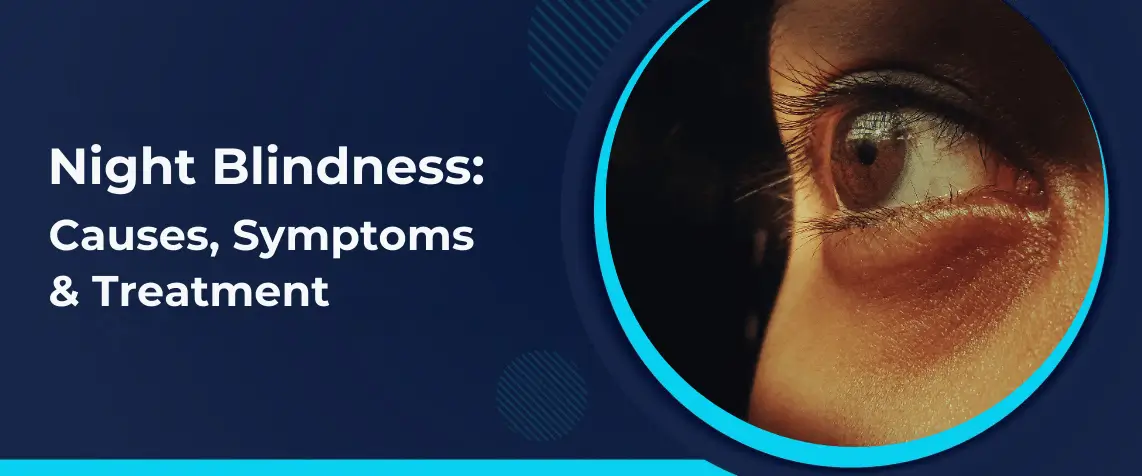Night blindness, also known as nyctalopia, refers to the inability of the eyes to adapt to low-light conditions. According to WHO statistics, night blindness affects nearly 1% of the global population. Though its name includes the word ‘blindness’, it doesn’t point to a complete loss of vision at night time, but increased difficulty in viewing things clearly in dim light. This condition is more pronounced when shifting from light to dark surroundings or driving at night.
Read more on:
ToggleWhat is Night Blindness?
Night blindness, while often mistaken for a standalone condition, is actually a symptom of a deeper, underlying condition or disorder. It adversely affects a person’s ability to clearly view nearby or distant objects in dimly lit environments or at night. Vision during the daytime remains unimpaired, in most cases.
| Symptoms | Blurry vision at night, photophobia, halos around light, difficulty adapting from well-lit to dark surroundings (and vice versa), headache, eye pain, nausea, and vomiting |
| Causes | Cataract, Glaucoma, Nearsightedness/Myopia, Vitamin A Deficiency, Retinitis Pigmentosa, and Congenital Stationary Night Blindness (CSNB) |
| Treatment | – Cataract – MICS, FLACS, and AI Robotic Cataract Surgery, – Glaucoma – Medication, laser, and surgery – Myopia – Prescription glasses, contact lenses, SMILE Pro, Contoura Gold, and other refractive surgeries – Vitamin A Deficiency – Vitamin A supplements, fruits, and vegetables – Congenital Stationary Night Blindness (CSNB) – Bright lights at home/work, low-vision aids, and adjustable electronics |
What Are the Symptoms of Night Blindness?
Contrary to common belief, night blindness has more specific symptoms than just cloudy or blurry vision in dimly lit surroundings. Let’s have a look at some signs and symptoms of night blindness:
- Blurry vision at night
- Light sensitivity or photophobia
- Halos or glares around lights at night
- Unable to see stars at night
- Difficult to adapt from well-lit to dark surroundings and vice versa
A few rare symptoms include:
- Eye pain
- Nausea
- Headaches
- Vomiting
What Causes Night Blindness?
Night blindness is a result of many underlying eye conditions. The most common causes for night blindness include:
- Cataract
A cataract refers to the clouding of a normally clear eye lens. This leads to hazy or blurry vision, especially in dim light. If a person gets cloudy vision in one eye due to a cataract, they are likely to experience vision difficulties in low light, i.e., suffer from night blindness.
- Glaucoma
Glaucoma refers to a group of eye diseases that damage the optic nerve. It is generally caused by high intraocular pressure (IOP). This can lead to temporary or even permanent vision impairment. It is a common cause of difficulty in viewing objects at night or in low light.
- Nearsightedness
Nearsightedness or myopia is one of the top causes of night blindness. This happens when the eyeball grows too long, restricting light from focusing on the retina correctly. A nearsighted person is unable to view distant objects clearly, especially in low-light surroundings.
- Vitamin A Deficiency
Vitamin A or retinol is responsible for providing the eye with rhodopsin (a light-sensitive molecule in the retina). It helps in smooth eye functioning and light absorption by the retina. A deficiency of vitamin A can lead to severe eye problems, including night blindness.
- Retinitis Pigmentosa
This refers to a group of rare eye diseases that can severely damage the retina. This does not allow light to reflect on the retina the way it should. This is a genetic disorder and can lead to reduced ability to see in dim light.
- Congenital Stationary Night Blindness (CSNB)
CSNB refers to a group of rare genetic eye conditions that impact your ability to see clearly in dim or low light. This is caused due to mutations in the GNAT, TRPM1, and LRIT3 genes. CSNB mostly affects people who are assigned male at birth. Currently, there is no known cure for CSNB, but it can be managed through various aids.
How to Treat Night Blindness?
Although night blindness is a symptom of several underlying eye conditions, most of them are treatable. Treatment can be administered through relevant corrective and treatment measures for the specific cause. Here are some treatments or corrective measures for night blindness:
- Nearsightedness – Prescription glasses, contact lenses, SMILE Pro, Contoura Gold, and other refractive eye surgeries.
- Cataract – Cataract surgeries, such as Micro-Incision Cataract Surgery (MICS), Femtosecond laser-assisted cataract surgery (FLACS), AI Robotic Cataract Surgery
- Glaucoma – Medication, laser, and surgery
- Retinitis Pigmentosa – Supplements
- Vitamin A Deficiency – Vitamin A supplements, fruits, and vegetables
- Congenital Stationary Night Blindness (CSNB) – Management by using brighter lights at home/work, low-vision aids, and adjustable electronics.
If you or anyone you know is struggling with night blindness, contact us today and book a consultation with Dr. Amanpreet Kaur, senior cataract and refractive surgeon, one of the best eye doctors in Chandigarh.
Frequently Asked Questions About Night Blindness
1. Do I suffer from night blindness?
If you have been diagnosed with myopia or any of the above-mentioned eye conditions, you will most likely experience symptoms of night blindness. The degree to which night blindness impacts your vision might vary according to the severity of the condition.
2. Who is most likely to get night blindness?
Older adults are more prone to developing eye problems like cataracts or glaucoma, which can make them experience symptoms of night blindness.
3. Which vitamin causes night blindness?
Night blindness is mainly caused by Vitamin A deficiency. Vitamin A is necessary for producing rhodopsin, a light-sensitive molecule in the retina that is responsible for facilitating vision in low light.
4. Is night blindness genetic?
Yes. Night blindness can be genetic. In this case, it is referred to as Congenital Stationary Night Blindness (CSNB), which is related to the TRPM1 gene mutation. Inherited night blindness is rare, affecting only 1 in 6000 people.
5. Is night blindness a disease or a symptom of another condition?
Night blindness cannot be considered a disease. Unless genetic, it is always caused by an underlying eye condition. So, if you start experiencing symptoms of night blindness, it is advised to get a complete eye checkup to determine the cause of this symptom.
6. Can I see clearly during the day if I have night blindness?
Depending on your underlying condition, you may not notice night blindness symptoms during the day if you’re in a well-lit environment. However, dark rooms or surroundings can increase the possibility of experiencing discomfort or unclear vision.
7. Can diet or lifestyle changes help manage night blindness?
Yes. Adding Vitamin A-rich foods to your diet if your condition is due to the deficiency of Vitamin A can help manage night blindness. Additionally, a few small changes like using electronics with adjustable brightness, modifying your work and living space to better fit your light requirements, can help lessen difficulty in viewing objects.





